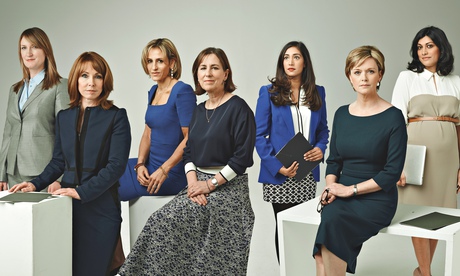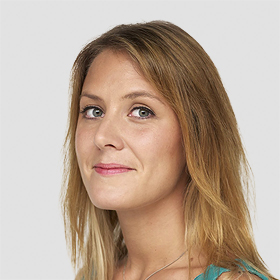It’s unusual to see the Newsnight triumvirate of Emily Maitlis, Allegra Stratton and Kirsty Wark having a laugh together. But they’re off-camera today, and with the election only eight weeks away they’re enjoying a gossip over politicians’ gaffes and evasionary tactics.
“They say: ‘There are three parts to that answer,’” says Wark, “and you go: ‘Yeah right.’”
“They always forget the third,” Stratton laughs.
“Exactly,” says Wark. “They’re trying to stop you interrupting them. Tony Benn used to do that.”
This will be an election year like no other. It is the first election in which social media will truly have an impact; the advent of seven-party politics is shaking up the established order. It falls to the news anchors and political interviewers to help us negotiate this new world with their tenacious pursuit of answers. In the past Jon Snow, Jeremy Paxman and David Dimbleby established themselves as the face of election coverage – but a changing of the guard is under way.
We’ve brought together the women who will be asking the big questions. What’s it like to put the prime minister in the hot seat? What do they think of the state of politics today? And how do you get a straight answer out of a politician?
Kay Burley: Sky News anchor
What are the main issues you’ll be grilling politicians on this year? Certainly immigration will be at the forefront of politicians’ minds.
Which topics interest you personally? That changes daily. Today it was the bus strike, because the traffic was really bad. Every aspect of your life is affected by politics.
What’s the biggest clash you’ve had with a politician? In my interview with Chris Bryant, he said that I was a bit dim. Subsequently we’ve agreed that I’m not and are now, in fact, friends.
Do you see a different side to politicians when the cameras are off? I see a lot of politicians socially – there are senior politicians who have had Christmas lunch at my house. But they know me better than to think they’ll get an easy ride on air.
How is the internet changing news broadcasting? It’s changing it very much. I’m the only journalist in the country who has been given the opportunity by Twitter to try out a new 30-second video app, like Vine, that will be rolled out after the election.
What’s the best way to phrase a question to a politician? I tend to go with Paxman: keep going until you’ve got the answer.
Do you think politics is becoming more informal? I try to be informal, chilled and irreverent, to reflect the mood of our afternoon audience. They’re not gods, they’re politicians.
What is your reaction to voter apathy, Russell Brand-style? Somebody threw themselves under a horse so I could vote, so the least we can do is turn up. It makes me quite angry actually to think that people will pass up on the opportunity to make a difference.
Have you ever felt out of depth on camera? I love being on my toes, I walk a high wire every day. But I have a fantastic executive producer and can call on her brain when I need to, and she can talk in my ear if she needs to.
How is the internet changing political broadcasting? I do think that the new media-savvy politicians are the ones who will be able to cut it. But they have to be very careful. There are an awful lot of pitfalls that they need to worry about. Look at what happened with Emily Thornberry.
Allegra Stratton: Newsnight political editor
What are the main issues you’ll be grilling politicians on this year? The EU, the over-65s, the under-35s. Labour wants to talk about the NHS, Tories, the economy; I want them to talk about everything else.
Which topics interest you personally? Wages haven’t gone up since the mid-2000s. I want to know how people are going to make a living and which skills they’ll need.
What’s the best way to phrase a question to a politician? Wit helps. Douglas Carswell took me to McDonald’s after he won his by-election, so I asked: “What sums up Ukip, a pint or a McFlurry?” But often the person I’m trying to interview is in the middle of a scrum. There are 50 people, and burly cameramen, so unless I forcefully elbow my way in, I won’t get the chance to ask anything.
Do politicians respond differently to female interviewers? Some people think our questions can be more raw. Once Ed Miliband kept ignoring me while the male political editors got their big, grand questions in. Eventually I asked: “What’s your biggest regret?” and the audience booed. I was later told that someone whispered: “Bloody female journalists – they always ask the most annoying questions.”
What’s the most out of your depth you’ve felt? I broke some housing news and an MP questioned my source. Jeremy [Paxman] said: “If it’s wrong, we’ll sack her!” Actually I was correct.
What’s the biggest clash you’ve had with a politician? With Alex Salmond before the referendum. I’d been on maternity leave and he said: “You’re a day tripper, what do you know?” He was saying: “You don’t care about Scotland” and I was saying: “Give me a break,” but I was also aware that I hadn’t been covering it for nine months. I don’t think either of us came out of the exchange brilliantly well.
How can politics become more diverse? There are a lot more young women in politics and it’s likely that future coalitions could be forged in the Commons crèche. Those relationships are as important as when people used to strike up a deal over the third bottle of wine in bars.
How do you make politics feel engaging and exciting to your audience? You have to remember that politics leaves some people cold. I once asked a young woman in Southall how she would vote in a by-election. I said: “Are you a Lib Dem?” and she replied: “No, I’m Aquarius.” But now, if you asked an equivalent young woman in Scotland “are you yes or no?”, she’d give you a speech. We provide information, but we try to do it in the most rigorous, analytical way, which gives the viewer power.
Emily Maitlis: BBC News presenter
What are the main issues you’ll be grilling politicians on this year? I could reel off a list – health, defence, welfare – but I think we’re in a post-manifesto age where nobody’s going to promise anything, since we may have a coalition. It’s almost up to politicians to set the agenda.
Which topics interest you personally? It’ll sound a bit spoddy, but I’ve never had a May when I wasn’t getting excited about some sort of polling stat. It’s a bit like studying earthquakes: you become interested in all the layers that caused it.
Are there any topics you dread coming up in interviews? I have a slight shutters-down on personal finance and pensions. Also, certain politicians are very good at calling you on something – Peter Mandelson, George Osborne – although I don’t dread them.
What’s the biggest clash you’ve had with a politician? The Ed Balls exchange [Maitlis pressed Balls on his inability to recall the surname of Bill Thomas, chair of Labour’s small business taskforce]. Some people say he had a memory blank, others say it was the moment Labour lost the election.
Do you think politics is becoming more informal? Pretend-informal. They come in their shirt sleeves, all chummy, but when their special adviser has been ringing you six times in the hour before, you’re thinking: “You’re not that cool.”
Do politicians respond differently to female interviewers? We always joke about it. If people don’t like a question you are asking, they talk about you being “shrill” and you think, actually, I had quite a quiet voice during that whole interview.
What’s your reaction to voter apathy? I think it’s appalling and if I was in charge I’d actually make it illegal not to vote. I can’t bear people saying all politicians are the same and there’s no point. That’s just being a lazy git.
What’s the best way to phrase a question to a politician? I suppose we have very different needs. Journalists try to get politicians to be interesting and politicians go out of their way to be dull. You’re saying, please be interesting! And they’re saying, I will resolutely not be interesting. It’s that Robin Cook line: if I don’t see an interview appear in any way in the papers I know it’s been a success. They want presence but dullness.
What will be the biggest surprise of this year’s election? I’d like to say it will be high turnout. It’s such an unprecedented election that hopefully people will just say they’re going to vote for somebody. Even the smaller parties could play a massive part.
Anushka Asthana: Sky News political correspondent
What are the main issues you’ll be grilling politicians on this year? It’s all about deconstructing the manifestos. They’ll make hundreds of promises, so we’ve got to push them point by point.
Which topics interest you personally? Childcare, equal pay, women in politics. Also, how do the policies affect people in terms of race, disability?
What’s the best way to phrase a question to a politician? Keep it short. At last year’s Tory party conference I decided I was going to ask a convoluted question about welfare policy and I lost my track, so what I ended up saying was: “Prime Minister, is this welfare?” It was Ali G-esque.
What do you think will be the biggest surprise of the election? People reaching out to do deals who we’d never imagined. I have met people who are toying between voting for the Greens and Ukip!
What is your reaction to voter apathy, Russell Brand-style? It’s idiotic. If young people don’t engage with the system, politicians are more likely to twist their policies towards older people and are less likely to provide what Russell Brand is calling for.
What’s the biggest clash you’ve had with a politician? The most grumpy interview I’ve done was Gordon Brown. All he could talk about was how the media had it in for him.
Are there any topics you dread coming up in interviews? I used to work for newspapers where I had a completely domestic focus. At Sky a huge amount of my time is taken up focusing on foreign-policy stories. You don’t dread it, but you really want to know your stuff before you take it on.
Do you think politics is becoming more informal? If anything people feel a greater distance between themselves and politicians at the moment. Cameron, Clegg and Miliband all suffer from the idea that they’ve not really done much else and gone through this very easy political life that’s separate to your average person in the street. They all want to seem less formal, but it’s a difficult thing to achieve.
How can politics become more diverse? By getting more women and more non-white people into Parliament. I think this is really important: the more women you have in Parliament, for instance, the more they talk about issues that women are more likely to care about.
Kirsty Wark: BBC Newsnight presenter
What are the main issues you’ll be grilling politicians on this year? I really want to drill down into policy on the economy, Europe and immigration. I think there’s a huge responsibility to be tough, because people are so confused about what might actually happen.
Which topics interest you personally? It’s a big step to decide to leave Europe. My father would be horrified at the idea after what he fought for in the Second World War.
What’s the best way to phrase a question to a politician? You want a one-two – a question that requires a second clarification. I asked Mrs Thatcher: “Do you understand why people in Scotland find you so patronising?” If the answer is yes, then why the hell are you patronising them? If it’s no, then why don’t you understand them?
What’s the biggest clash you’ve had with a politician? I did an interview with Andy Burnham where twice he went: “Don’t interrupt me!” and I hadn’t – I was just sitting looking incredulous.
How can politics become more diverse? It’s about time we had a female chancellor. Rachel Reeves is incredibly clever, so is Justine Greening. You want to see them get the top jobs.
What is your reaction to voter apathy, Russell Brand-style? We should involve under-18s in debates. You can marry and have a baby at 16 but not vote. What responsibility does that foster?
How do you make politics feel engaging and exciting to your audience? Put some humour into things. After the last election, Nick Clegg was trying to work out whether to go into a coalition or not. We heard he was on a train and had a cat and mouse chase – off and on trains – to find him. Eventually he and his team were in the next carriage with the door shut and we were filming them through the window to find out what was going on. It was very funny.
How is the internet changing news broadcasting? Young people are on Twitter and the politicians have come late to the game, but they’re starting to catch up. Young people are perfectly happy to engage if you give them the tools to do it. In the 21st century, if you want young people to vote, we need some kind of proper electronic voting.
Julie Etchingham: ITV News at Ten anchor
What are the main issues you’ll be grilling politicians on this year? We did a poll at ITV News, and the biggest concern of viewers was how politicians will tackle the NHS. But I also want to unpick some of the language politicians use: we’ll be sick to death of their tried-and-trusted phrases come election day – what do they actually mean?
Which topics interest you personally? I’m a middle-aged mother of two, so I’m interested in health and education. Also the modern slavery bill and human trafficking.
Are politicians wary of you? In the campaign period they’re on their mettle with everyone – it must be a constant feeling of carrying a Ming vase across an ice rink.
What’s the biggest clash you’ve had with a politician? I had one with Alex Salmond over the economic argument for Scottish independence. And last year I had a good to-and-fro with Lord Smith, head of the environment agency. But some of the most rewarding interviews aren’t clashes at all.
What’s the best way to phrase a question to a politician? Sometimes it’s best to get there softly – when I went to interview Hillary Clinton, we got round to the big Bill question [about his affair], and she put her head on one side and said: “Well, I always knew he was going to be a hard dog to keep on the porch.”
Do you get to see a different side to politicians when the cameras are off? I did a day out with Gordon Brown when I was six months pregnant, and I had a nice chat with him about family. He was incredibly warm and witty and I kept thinking this will be amazing on camera, but as soon as it was on it was back to the hard politics. You could see a different persona.
Do you think politics is becoming more informal? I was watching the BBC’s Inside the Commons series and if you look at some of the ceremony that still goes on you wouldn’t think so. But social media puts an even greater onus on the politicians and broadcasters to find a way of engaging with people at a greater level.
Do politicians respond differently to female interviewers? It’s dangerous to go down the line of saying women interview differently, because there’s as much variety among the women’s styles as the men. But you’re not squaring up in a big testosterone match, you just don’t have that dynamic.
Tina Daheley: Radio 1 Newsbeat presenter
What are the main issues you’ll be grilling politicians on this year? It’s up to our audience to decide – at Radio 1 we’re launching a survey. The concerns we expect to come up are inequality, the cost of living, immigration, jobs, zero-hour contracts, free speech.
Which topics interest you personally? Subjects that aren’t really covered elsewhere – things like revenge porn, self-harm, bullying, transgender issues, trust in the police.
How do you make politics feel exciting and engaging for your audience? If you want to engage young people with politics don’t use the word politics. On Free Speech [the BBC 3 debate show for young people that Daheley co-hosts] we ask: what are the issues that matter to you, what do you care about? Also, engage them in conversation in the places they hang out, like Facebook, Twitter, Instagram.
What is your reaction to voter apathy, Russell Brand-style? Look at the Scottish referendum: voter registration was 97%. Young people do care, they just think that politicians don’t care about them. We also need to make it easier. Online voting should be the next step.
Do you think politics is becoming more informal? If it is, that’s a positive thing. But politics needs simplifying – the processes to do with Parliament, the language. Our listeners think PMQs is ridiculous: grown men acting like children and shouting.
Are there any topics you dread coming up? I don’t think there’s anything I dread, because as journalists the job is completely unpredictable and you deal with different things all the time. But explaining complicated issues to our audience, so taxation, for example, is challenging. Why do we have to pay tax when rich people get away with paying little or no tax and politicians and companies help them do that?
What’s the best way to phrase a question to a politician? We get our listeners to do it, whether that’s on social media or recording voice memos on their iPhone. But getting politicians to talk about their personal experience of an issue is good: so starting the question with: “When was the last time you… smoked cannabis?” if we’re talking about a drugs policy or “Worked for the minimum wage?” if we’re talking about jobs and pay. It makes them more relatable, humanises them.
What will be the biggest surprise of the election? The result. And also social media – how much of the conversation will be happening online.
Do you think politicians respond differently to female interviewers? You sometimes have to work harder to gain respect. I’ve been in situations where the politicians will defer to my male colleague. I still see people surprised when I turn up to do the interview.













